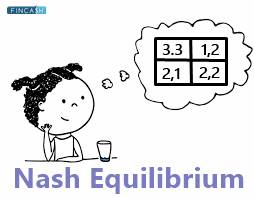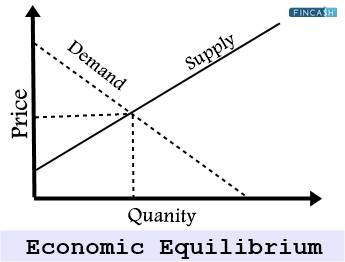
Table of Contents
Nash Equilibrium
What is the Nash Equilibrium?
A Nash Equilibrium meaning is defined as the strategies that all players are supposed to follow and no player will receive any benefit if they changed these strategies. In other words, it is when the player sticks to their original plan even if they knew the strategies their opponents are following. This theory is mainly used for identifying the outcome of certain economic factors like auctions and currencies. Nash Equilibrium is achieved when the players do not change their initial strategy.

Let’s understand the concept with an example.
Examples of Nash Equilibrium
You must have heard of the coordination game. As the name suggests, each player is supposed to coordinate with other players to receive the maximum benefits. However, they also have their individual perspectives. Let’s say two friends have decided to spend some quality time either watching movies or going shopping. One of them chooses clubbing over movies, while the other one wants to spend the time watching trending movies. In this case, both are Nash Equilibria. That means, neither of them would like to cooperate with the other one’s choice.
Nash Equilibrium is often used for the Prisoner’s Dilemma problem where both prisoners have the option of either defecting or cooperating. The person who chooses to defect will have to spend only a small amount of time in jail. If both of them defect, they will be put in jail for a moderate time. However, if one of them defects while the other one cooperates, the defector will be set free immediately. However, the cooperator will end up spending a considerable amount of time behind bars.
Talk to our investment specialist
How does this Game Theory Work?
So, the Nash equilibrium is the game theory that suggests the players can get the optimal returns from the game if they stick to their original strategy. Put simply, Nash Equilibrium is when the person does not intend to change their strategy even if they know the opponent’s strategy. The person will not get the best results if they deviate from their original plan. However, the theory only works when the other person also does the same. Basically, no participant must deviate from their original strategy.
Developed by the famous American Mathematician John Nash, the Nash Equilibrium applies to the logical games where the best outcome is possible only when the players do not deviate from the original plan. The applicability of this equilibrium makes it an important concept. You can use this game theory for an extensive Range of areas, including but not limited to social sciences and Economics. It can also be defined as the decision-making theorem that focuses on the initial strategy of the players.
The theory suggests that any game can result in a win-win for each player since they achieve the results they desire. As mentioned above, for the Nash Equilibrium theory to work, it is important for each player to not change their original decision (it doesn’t matter whether or not they are aware of the plans of the opponents).
All efforts have been made to ensure the information provided here is accurate. However, no guarantees are made regarding correctness of data. Please verify with scheme information document before making any investment.






